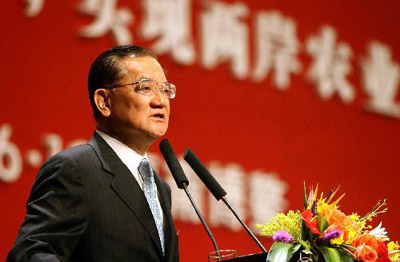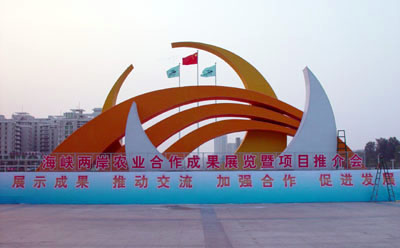| Home / Government / Focus News | Tools: Save | Print | E-mail | Most Read |
| Cross-Straits Agricultural Cooperation Forum Opens |
| Adjust font size: |
The mainland and Taiwan opened a forum on Tuesday in Boao, island province of Hainan, aimed at boosting agricultural cooperation and promoting peace and development across the Taiwan Straits. The mainland and Taiwan have started to supplement and benefit from each other in cross-Straits trade and economic cooperation thanks to their concerted efforts made over the past two decades, said Jia Qinglin, chairman of the National Committee of the Chinese People's Political Consultative Conference, the country's top advisory body. The Communist Party of China (CPC), Chinese Kuomintang, People First Party and New Party have been working actively in recent years to expand and deepen trade and economic cooperation, Jia told the forum.
On behalf of the CPC Central Committee and CPC General Secretary Hu Jintao, Jia congratulated the organizers of the forum, saying the mainland side will "earnestly implement our solemn commitments to the Taiwan compatriots. "We won't hesitate in time of fluctuations; not the least will our endeavors be halted by a few people's interferences," he said. He warned people on both sides of the Straits to consciously oppose all secessionist activities by the "Taiwan independence" forces. "We must never allow anyone to split our country, undermine cross-Straits relations or impair the bright outlook of cross-Straits peace and development in any name or by any means", he told an audience of more than 400 experts, scholars and industry leaders from the mainland and Taiwan. Jia, also member of the Standing Committee of the CPC Central Committee Political Bureau, made a four-point proposal on how to further exchange and cooperation in the agricultural sector. First, he said the two sides should make concerted efforts facilitate such cooperation. Second, it is necessary to make broad plans and take all factors into consideration to expand and deepen such cooperation. Third, the mainland and Taiwan should seek to protect and expand the interests of farmers from both sides of the Straits. "We should put ourselves in their position, consider their aspirations and demands, and do our best to solve their problems and create conveniences for them," Jia added. Fourth, Jia called on the two sides to proceed with long-term perspectives. "Step by step, we should build up and improve a mechanism for cross-Straits agricultural cooperation." Chinese Kuomintang Honorary Chairman Lien Chan also expressed sympathy for the farmers.
"After our extensive contacts with Taiwan farmers, we feel it is both important and pressing to enhance cross-Straits cooperation in the agricultural sector," he added. It is therefore "of great significance" for experts, scholars and agricultural proprietors from both sides of the Taiwan Straits to discuss problems confronting their farmers and prospects of their cooperation, said Lien, who arrived in Hainan on Monday. Such cooperation will solve the bottlenecks that hinder Taiwan's agricultural development and will in the meantime create new opportunities to boost agricultural production on the mainland, said Lin Fong-cheng, vice president of the KMT National Policy Foundation. The major theme of the forum is how the two sides can join hands and assist each other to face opportunities and challenges in agricultural development after their respective entries to the World Trade Organization, Lin said. A case in point is the "three direct links", which Lien said will help both sides sharpen their competitive edge in the agricultural sector. "Most shipments between the mainland and Taiwan have to go through Hong Kong, Macao or other regions. It takes longer and costs more and therefore impairs our competitiveness." The mainland has been urging early realization of these "three direct links" of trade, mail and transport across the straits since 1979. Cross-Straits trade of agricultural products was valued at US$421 million by the end of 2004 and warmer ties in the recent two or three years have spurred an influx of Taiwan farm produce into the mainland market. To date, the mainland has granted market access to 22 categories of Taiwan fruits and adopted zero-tariff policies on 15 of them. It has also exempted tariffs on 11 categories of vegetables and eight kinds of aquatic products. "The mainland consumers have reported a robust demand for quality farm produce from Taiwan, including its tropical fruits, flowers, seeds and seedlings," according to He Ziyang, an official with the Ministry of Agriculture.
(Xinhua News Agency October 17, 2006) |
| Tools: Save | Print | E-mail | Most Read |
 |
| Related Stories |



